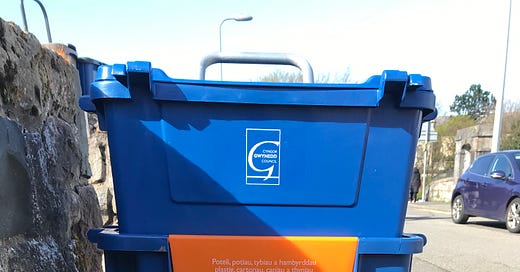Last week we went to North Wales for a few days. It mostly rained, and then it rained some more, but it’s a lovely part of the world even when it rains you can’t beat the fresh dougnuts and the arcades on the pier at Llandudno.
They have pretty good bins in Wales too.
If you live in Wales, or have been there on holiday, it won’t surprise you to hear that Wales is one of the best places in the world when it comes to how much householders recycle.
It also won’t surprise you to learn that their impressive recycling sits within a much broader strategy around the circular economy.
Across Wales, the latest figures show a recycling rate of 65.2%, compared to a woeful average of 44% in England.
This tends to be the kind of thing I notice on holiday, thanks to the work I’ve been part of at Zero Waste Leeds on various waste reduction campaigns, including this one:
So why are things so different?
There’ll be all sorts of reasons for this - but let’s start with the bins you can see in the picture above.
There are a few key things that tend to lead to higher recycling rates.
One key factor in higher recycling rates is collection of a wide range of recyclable materials from people’s homes.
Alongside that it helps a lot if you can work with householders to help them to sort these items at home, rather than everything being thrown into one bin (“co-mingled” in waste industry jargon).
Sorting materials in this way helps to deal with one of the big issues in any recycling system - “contamination”.
If, for example, broken glass gets mixed up with paper and card, it’s likely to make that paper and card more difficult to recycle. So your recycling rate drops.
And that brings us onto food waste
I’m pretty sure one of the main reasons for Wales’ high recycling rates is that they collect food waste from people’s homes.
You get a food caddy, which is collected weekly, as another lovely photo from a previous holiday in Conwy illustrates.
Collecting food waste is key for a few reasons.
One is that it provides the opportunity, primarily through anaerobic digestion, to generate green energy and bio-fertiliser which can be used in farming and land regeneration.
It’s important too for a reason I mentioned earlier - “contamination”.
Collecting food waste separately tends to reduce the amount of contamination (from food) of potentially recyclable materials.
This is particularly the case if your city’s waste processing system includes a process whereby they attempt to remove recyclable materials from “residual waste” (ie all the waste that doesn’t go in people’s recycling bins), before it gets sent for energy recovery (incineration) or to landfill.
And finally, food waste is one of the main reasons your bins tend to smell after a while.
So if your “residual waste” bin doesn’t have any food waste in it, that means it’s less likely to smell, and householders are more likely to accept it being collected less frequently (once every three weeks in Wales, as far as I know).
And with fewer collections of residual waste, more resources can go into recycling.
But it’s not just about waste processing systems
There’s a bigger picture here too, and this is perhaps what separates Wales most from England.
I’m currently studying a 10 week Open University course on Futurelearn - Climate Change - transforming your organisation for sustainability.
I’ve found it really useful so far, and one thing I like is that they take the Wales Wellbeing of Future Generations Act as their starting point.
As it explains here:
The Well-being of Future Generations Act requires public bodies in Wales to think about the long-term impact of their decisions, to work better with people, communities and each other, and to prevent persistent problems such as poverty, health inequalities and climate change.
Now I don’t live in Wales, and I’m not over all the detail, but as an observer I think this is an enormously important piece of legislation - providing the long-view that is so often missing from today’s politics - particularly when we have such incredibly challenging problems to solve, like the Climate Emergency.
Problems like this need immediate action - alongside long-term thinking.
It’s a theme I explored more in a recent post after reading The Good Ancestor — How To Think Long Term in a Short Term World — by Roman Krznaric.
Of course, there’s always the risk of thinking the grass is always greener.
And I doubt everyone in Wales is bought into sorting all their waste at home. I imagine too that some people really aren’t happy about fewer new roads being built, thanks in part to legislation that invites politicians to think of future generations.
But it’s so uplifting to be reminded that things can be done differently - at a time when national politics in England mostly makes me despair and fear for the future.
So I’ll no doubt be heading back to Wales soon
On my first day back at my desk, I was mostly distracted by this beautiful short film about the future vision for Bannau Brycheiniog - formerly known as the Brecon Beacons.
As I outlined here, I think it’s a beautiful piece of climate storytelling.
It’s storytelling that recognises current issues, shares a vision of a better future, taps into local pride & connection to a place, and tells stories of good things happening now.
Beautiful and inspiring.
And, I imagine, inspired by the kind of perspective that comes when thinking about future generations becomes part of how a country is run.






